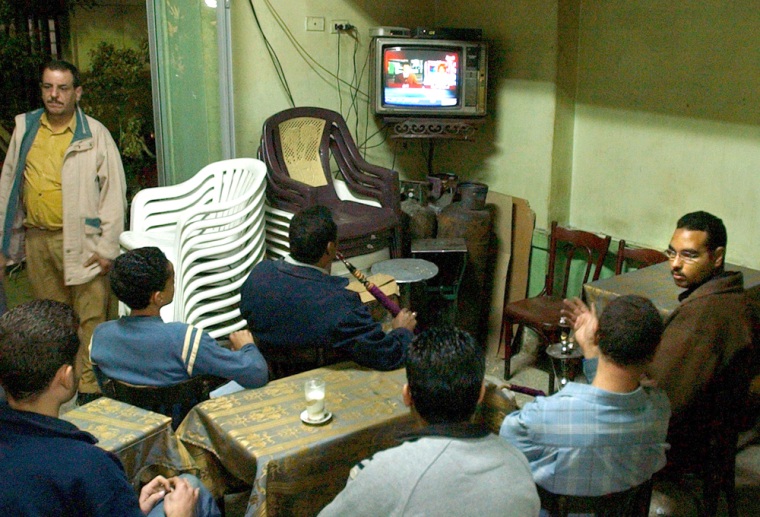Viewers across the Arab world last weekend were riveted to their televisions as Iraqi men and women, many with obvious joy, took advantage of their right to vote for the first time in 50 years.
But whether the elections in Iraq will help advance democracy in the rest of the region is still an open question.
In most neighboring states, power is either in the grip of emirs or monarchs, or in the hands of a ruling party led by one man and his cronies. In Syria, power has passed from father to son. Likewise, in Egypt and Libya, the sons of the rulers are also being groomed to succeed their fathers.
Although the Bush administration is hopeful that the example of democracy in Iraq will spark democratic reform in the rest of the region — a theme the U.S. leader will touch on again in his State of the Union speech later Wednesday — most observers are skeptical.
Results yet to be seen
"So far, I don't see a positive or negative affect," said Dr. Gamal Abdul Gawad, head of the International Relations unit at the Al Ahram Center for Political and Strategic Studies in Egypt.
"Those who are for democracy and against this kind of violent activity in Iraq feel victorious, but no momentum has been created to activate or unleash a democracy movement in other Arab countries."
Gawad, like many others, feels that Iraq must be able to reduce the level of violence and address the problem of Sunni representation before a positive spillover will occur. "There is a wait-and-see attitude in the Arab World," he said.
Raid Qusti, the Riyadh bureau chief of Arab News daily, said many in the region felt the election lacked credibility.
"Iraq is unique in that it is still occupied by American forces. A lot of people in the Arab street are not quite content with the idea of elections being held with occupiers still in the country. They see it as games by the U.S. administration to elect a puppet government. So there is doubt among people in the Arab street,” Qusti said.
He feels the most important change must come from inside the country, not at the hands of an external power. "We would want change to come from within.”
For example, he sees Saudi Arabia's upcoming municipal elections, the first in 40 years, as a "small step" in the same direction.
"People are not used to voting in elections and are used to everyone being appointed. Seeing people campaigning is a new thing in the country and will take some time,” Qusti said.
Pressure from U.S. might be most effective tool
Others believe that direct bilateral pressure, from the United States and others, will be more successful than the elections in neighboring Iraq.
"I think the impact of outside pressure on independent states can yield better results than the results of the Iraqi elections," said Dr. Mostapha Hamarneh, the director of the Strategic Studies Center of Jordan University in Amman, Jordan. "I think what will have bigger impact is the gentle relative pressure that is applied bilaterally by outside forces."
A few cautious voices believe that, in time, the Iraqi elections will put pressure on neighboring countries to democratize.
In Cairo, Hisham Qassem, chairman of a human rights organization and chief executive officer of a new Arab daily newspaper, believes that both the Iraqi and Palestinian elections have given impetus to democratic reform.
"Once people feel there are positive effects from the democratic process, they will want the same. Especially countries like Egypt who felt they were ahead of Iraq but are now lagging behind,” he said.
No turning back now
Many Kuwaitis, by far the most optimistic about the effects of the Iraqi elections on neighboring countries, see the elections in Iraq as a turning point.
"For sure, we will have effects. It is already starting," said Dr. Shamlan Al-Essa, director of the Center for Strategic and Future Studies of Kuwait University.
That's why all the regimes surrounding the area don't want the elections to be successful," he said. "Once they have security in Iraq, democracy will be the issue. Bush was right in that democracy will spill over. But we still have to see how things turn out with the appointing of a new cabinet."
For conversations with analysts across the region, it's evident that there are many views about the Iraq election's impact.
But, what also is clear is that from Egypt to Saudi Arabia and beyond, voices of dissent are growing louder as human rights activists, academics, journalists, opposition leaders and even diplomats, talk about how to bring about change.
